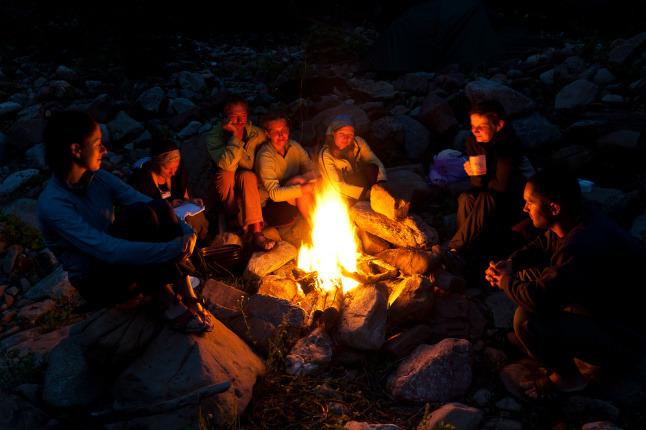"Eco-Terrorists" And Tree-Huggers Reunite!
One year ago, an aging contingent of Earth First!ers plus some of their young'uns converged on the banks of the Salmon River in central Idaho. Sixty or more stalwarts met to celebrate the 20th anniversary of the beginning of the so-called Cove-Mallard Campaign, a successful effort to prevent clear-cuts from replacing huge, old forests in the area near the small towns of Elk City and Dixie. Not surprisingly, there was beer.
Nobody, this time, gave us dirty looks when we arrived; nobody terrified by the sight of a bunch of aging agitators called the cops.
There were the usual arguments about food, with the militant vegans claiming the moral high ground and the ravenous carnivores hogging (admittedly a bad pun) the campfire. Those of a more pragmatic bent tried whatever was offered, thus earning the dubious honor of being dubbed "opportunivores." The beer was mostly home-brew with a few cases of Pabst Blue Ribbon thrown in for emergencies. One kind soul brought a generous supply of moonshine infused with, we think, cedar bark.
So yes, in addition to hugging trees, we drink them, too. Saturday night was highlighted by a candlelit tribute to fallen eco-warriors—10 humans and one canine. Deeds, mis- and otherwise, were recalled, mock recriminations aired, and toasts offered. Then we sang and danced in the dust.
Speaking of dust, one of the dearly departed, Cindy Strand, arrived in the form of ashes carried in a coffee can by her daughter, Sheryl. Nicknamed "Thunder," Cindy was our base-camp drill sergeant during the campaign's fractious early years, when dozens of citizens from around the country were getting arrested. Many were also jailed after being charged with a kitchen sink's-worth of misbehavior, including mooning authorities, felony conspiracy to steal a road and "violating" the U.S. Forest Service.
Results were mixed. A judge, scowling, threw the mooning case—along with the arresting officers from the Forest Service—out of his courtroom. The road-stealing charge was reduced to something akin to trespassing.
As for violating the Forest Service, which was explained as violating agency orders to come down from the trees or to stop blocking logging trucks, way too many otherwise law-abiding Americans, including myself, logged (another admittedly bad pun) way too many days, weeks and months in jail, doing community service and then squirming under the heavy hand of a federal probation officer.
In other words, a fine time at the reunion was had by all. One crackdown we all agreed we won't soon forget occurred in August 1993, when some 60 federal agents from various jurisdictions raided our privately owned base camp and confiscated two truckloads of "evidence." The treasure trove included things like diaries, books, letters from concerned moms ("What do you do all day when you sit in a tree?"), and tent spikes used for the first-aid teepee, not for hammering into trees. Also, believe it or not, a well-worn copy of "The Lorax," that revolutionary book for children by Dr. Seuss. None of our possessions were ever returned or used in any legal proceeding. And no, we are not making this up, as Dave Barry is wont to say.
One other event dredged from two decades past: We also got sued by the logging and road-building contractors for $11 million, though the jury of our "peers" in rural Idaho awarded them a mere million. One of our lawyers could not resist calling it a "clear-cut victory." None of us had a penny; we all managed to own nothing.
But back to Cindy's ashes. On getaway morning, we waded into the Salmon River, the River of No Return, and broadcast (apparently the official word) them to the deep, or in this case, the shallows. A few of us were moved to tears and some just raised their beers, and a lawyer among us wondered if this were yet another illegal act. If so, this time there was nobody there to bust us.
Mike Roselle is a co-founder of Earth First! He co-wrote this story with Uncle Ramon (an assumed name), a former insurance executive who joined the Cove-Mallard Campaign in 1993.
–
This essay first appeared in High Country News.
